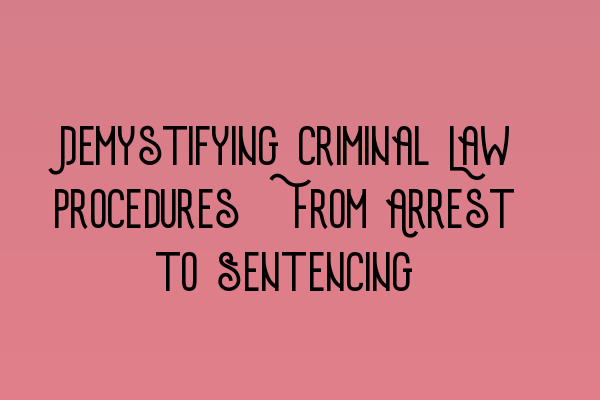Demystifying Criminal Law Procedures: From Arrest to Sentencing
Welcome to SQE Criminal Law & Practice Law UK! In this blog post, we will demystify the various procedures involved in criminal law, taking you through each step, from arrest to sentencing. Whether you are a law student studying for the SQE exam or a legal professional looking to expand your expertise in criminal practice, this guide will provide you with valuable insights.
1. Arrest
When a crime is committed, the first step in the criminal law process is often the arrest of the suspect. The arrest can be made by a police officer or a private citizen under certain circumstances. It is crucial for the arresting party to have reasonable grounds for suspicion, as arrests made without proper grounds may not stand up in court.
Once arrested, the suspect has certain rights, including the right to legal representation. It is important for individuals to be aware of their rights during the arrest and to seek legal advice at the earliest opportunity.
2. Police Investigation
After the arrest, the police will conduct an investigation to gather evidence and build a case against the suspect. This may involve interviewing witnesses, collecting forensic evidence, and examining any relevant documents or records.
Understanding the procedures and techniques used by the police during the investigation is crucial in criminal law practice. Stay informed and prepared by keeping up-to-date with the latest updates in UK criminal laws. Learn more about updates in UK criminal laws here.
3. Charging and Bail
Once the police have gathered enough evidence, they will decide whether to charge the suspect with a criminal offense. If the decision is made to charge, the suspect will appear before a court, where the charges will be presented. The court will then decide whether to grant bail to the suspect or remand them in custody until the trial.
Understanding the intricacies of charging and bail procedures is essential for criminal law practitioners. Consider attending workshops and seminars on criminal practice to expand your expertise. Find out more about workshops and seminars on criminal practice here.
4. Trial Process
Once the suspect has been charged and bail has been determined, the case will proceed to trial. The trial process involves presenting evidence, examining witnesses, and making legal arguments in front of a judge and/or jury.
During the trial, both the prosecution and the defense will have the opportunity to present their case. It is important to understand the rules and procedures regarding criminal evidence. A detailed analysis of criminal evidence rules can be found here.
5. Sentencing
If the defendant is found guilty, the court will proceed to sentencing. Sentencing can range from fines and community service to imprisonment or other forms of punishment. The judge considers various factors, such as the severity of the offense, the defendant’s criminal history, and any mitigating circumstances, in determining the appropriate sentence.
For a deeper understanding of specific types of crimes, such as fraud and financial crimes, it is beneficial to explore relevant resources. You can find a deep dive into fraud and financial crimes in the UK here.
Conclusion
Understanding the various procedures involved in criminal law, from arrest to sentencing, is essential for both law students and practitioners. By staying informed, expanding your expertise, and studying relevant resources, you can navigate the complexities of criminal law with confidence.
Remember, SQE Criminal Law & Practice Law UK is here to support your journey. If you are a law student, consider enhancing your SQE Criminal Law study group experience. Learn more about enhancing your SQE Criminal Law study group experience here.
Thank you for reading! Stay tuned for more insightful content on criminal law practices.
